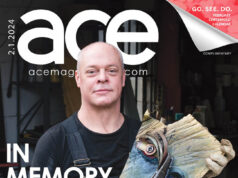by Alan Sculley
JJ Grey may bill his albums as JJ Grey & Mofro, but it’s not like his records have ever been anything but essentially solo efforts, in keeping with the current solo tour (stopping at Louisville’s Headliners, March 24).
That’s because the vast majority of work on the albums has been done by Grey himself. He writes all of the songs, makes detailed demos of the songs and records the most of the instruments on his albums himself.
“In the studio I’ve always had it pretty much done (myself), and then I just bring guys into play any time I get sick of hearing myself play,”Grey said in a recent interview. “They can take what you do, and they’re still going to change it a little bit because their feel might be a little different. But for the most part, it’s kind of like I’ll put sheet music right in front of them, but they learn it off of the (demo) CD.”
Grey has been mainly a do-it-yourself recording artist ever since the Jacksonville, Florida-based musician formed the first edition of Mofro and made his first CD, the 2001 release, Blackwater.
He’s made four albums since then, the latest being Georgia Warhorse.
Part of the reason Grey records most the music for his albums instrument by instrument is a simple matter of practicality. The facility where all of his albums have been made, Retrophonics Studio in St. Augustine, Florida, is better suited to that approach.
“I mean, at Retrophonics you can set up and cut live, but that’s a lot of people to have in at one time. Grey said. “And given the nature of touring, when you come off of the road, the prep work to set up to record that many people, it’s a lot more (work).”
Grey’s approach to making record making may have been the same from album to album (including using the same producer, Dan Prothero, on each of his CDs), but his last three CDs, in particular, have each had distinctly different feels.
The 2007 release, Country Ghetto, was primarily a gritty, rocking affair that also had a strong element of soul to its sound.
With the 2008 CD, Orange Blossoms, Grey went for a considerably different sound. The songs overall were more laid back and he frequently supplemented the basic guitar/bass/drums/keyboards instrumentation with strings or horns, which gave the CD more of a sleek feel.
Now on “Georgia Warhorse,” Grey has stripped back his sound (although his Mofro horn players Art Edmaiston and Dennis Marion contribute to a few songs) and has gone for a more rough hewn style.
“I felt like Georgia Warhorse should be darker, for sure,” Grey said. “I didn’t hear strings anywhere really. I mean, strings can be dark, too, but I just didn’t hear them. I just heard simple background vocals. Well, they’ve all been simple (on the albums), but I just did my own background vocals rather than get background vocal singers. I just felt the background vocals should be a little more simple. So yes, it just wound up that way. To me, it is sort of rootsier in a way.
Although Grey noted he’s heard from some fans that consider the new CD to be rather mellow, he says, “To me, I think this album is more rocking,” he said. “Like ‘The Hottest Spot In Hell’ and ‘All,’ I think of those songs, they’re kind of driving and rocking.
“I wanted it to hiss and spit a little more than Orange Blossoms,” Grey said. “And sooner or later I’m going to write a record that’s really going to hiss and spit, even more than all of them.”
Like all of his albums, though, Georgia Warhorse is anything but one-dimensional. While songs like “The Hottest Spot In Hell,” “All” and “Slow, Hot & Sweaty” set a rocking tone for the album, there are also songs like “King Hummingbird,” a gentle, folky and primarily acoustic tune, a song steeped in soul called “The Sweetest Thing” (which features Toots Hibbert joining Grey on vocals), a spunky bit of Southern-flavored acoustic rock on “Hide & Seek” and some New Orleans-ish funk on “Diyo Dayo.”
“I like an album to kind of be representative of several different feels, like a good story or a good film,” said Grey, who is currently supporting “Georgia Warhorse” with a short run of solo shows without his backing musicians in Mofro. “There are angry, loud moments. There are quiet, tender moments, so to speak, or sad moments. There are happy moments. There are almost like laughing moments or whatever. And I like for a record to feel that way.”
One of the other highlights of the “Georgia Warhorse” project for Grey was getting reggae/soul great Toots Hibbert to sing on the tune “The Sweetest Thing.”
“I met him at a festival several years back, and we just hit it off,” Grey said. “I sat in with him. I played harmonica one night. And we just hit it off. And he’s awesome. He’s like ‘I’d really like to do something with you.’ I’m like ‘well, I’m working on a new record.’ He says, ‘Well, so I am. So I’ll sing on one of your tracks and you sing on one of mine.’ So he sang on ‘The Sweetest Thing.’
“Of course, he did that down in Jamaica,” Grey said. “I wasn’t there. I knew it would be fine. I sent him a copy of the song with me singing all the way through the whole song. So he kind of knew where everything laid, (had) a lyric sheet and then a copy of the music with no singing on it. He just sang it. And then just before the tour started, I went down to Jamaica and shot some video stuff with him for the song and hung out for a couple of days and sang on his record, at his studio, the Anchor, down there in Jamaica, in Kingston. It was great. It was really, really cool to go down there and hang for a couple of days.”
Georgia Warhorse figures to continue to raise Grey’s profile on the music scene. His popularity has already grown considerably since he signed to Alligator Record and released Country Ghetto. Grey represents part of the label’s effort to broaden its scope beyond the blues roster that has long defined Alligator. The label has turned out to be a good fit for Grey.
“Part of the reason is that they work so hard and they’re hungry,” Grey said. “They’ve been around for 30-something years and they’re hungrier than a label that’s just starting out that has plenty of money behind them. Alligator, they’ve got plenty of money, but they’ve got plenty of respect, and they’ve got enough money to do the work. And that’s what they do. They do the work.”
Grey’s also gained notice for writing the score to the acclaimed 2009 documentary, The Good Soldier.
“Getting to do the soundtrack, the music for the movie, the documentary ‘The Good Soldier,’ that was awesome. Then to have that film win an Emmy, that was great, too,” he said. “Just getting to do all of that stuff (was great), and I’d love to do more of that stuff, soundtrack stuff, any of that kind of stuff. I like seeing stuff, images, and putting music to images.”
JJ Grey will play Headliners in Louisville March 24







